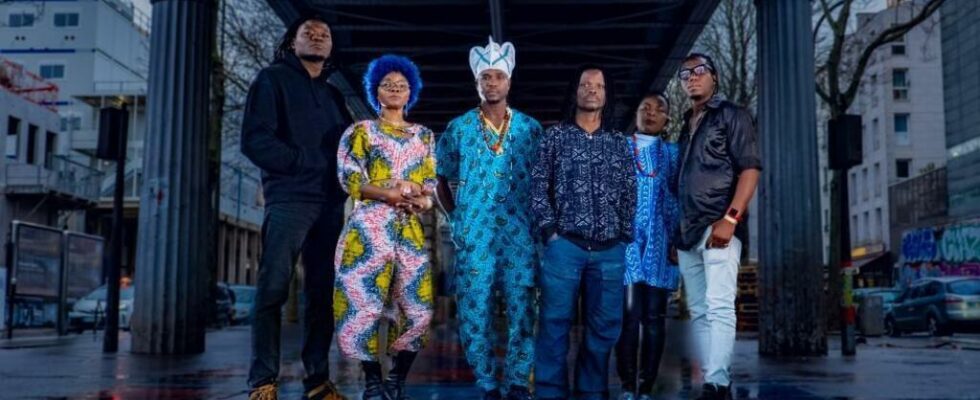After the success of his first album BIM#1, published in 2018, Benin International Musical is back with Positive Vodoun. With this second opus recorded in the United States, Benin and France, BIM tells the story of Africa in the form of an ode to Vodoun culture. A tribute to the music of the ancestors of Dahomey, very current with its rock, rap and pop sounds. Meeting with Brigitte Kiti, singer-rapper, Jimmy Belah singer-drummer, Yaovi guitarist and Jérôme Ettinger, artistic director at the origin of the collective.
5 mins
RFI Musique: the vodoun spirit is at the heart of your work with this new album Positive Vodoun. This is the music of the ancestors of Dahomey. It is found in traditional ceremonies which implore the animist deities but also in evangelical churches. Where does this influence come from in your music?
Brigitte Kiti: Basically, Benin is a Vodoun country even if it is a secular country. It all starts from the rhythms played in churches. They all come from Vodoun convents and are numerous. Examples: the sakpata, also played in Catholic churches, the egoungoun, rhythm of ghosts, played in evangelical and celestial Christianity churches. In fact, we take a vodoun rhythm and we perform a religious song. As long as it dances, it sings and it’s rhythmic, it works! For us, it is nothing more than a way of living, a way of seeing things, of living in symbiosis with nature. In every house in Benin, ancestors are venerated regardless of people’s faith. Me, I am Christian, Catholic but I also practice this animist cult. Beyond all religions, this spiritual practice unites human beings. We can be Christian, Voodooist, secular, atheist, we can understand each other. As proof: BIM is made up of both Christians and Voodooists. For a long time, for centuries, vodoun has been demonized and considered witchcraft, black magic. Through the title of the album, we want to show the complete opposite: the positive aspect of this practice!
We will focus on the title “ Biowa » which was recorded with a choir. How was this song written that stands out from the album? ?
Jimmy Belah: It’s true that this piece is special. It’s neither rock nor rap. On this title which means “destiny” there is a vodoun base fused with a gospel song. It all started in the attic of the Château du Port aux Meules, in Vertou, near Nantes. On the guitar, Jérôme started playing the chords and I sang a very powerful song. Then Lionel, the percussionist, found the rhythm with a big bell. Then the chorus came and the very catchy verse with a folk coloring. This was the first step. In Benin, I naturally went to my Jehovah Jiré temple to direct the parish choir. It must be said that my father was a choir director and my mother a traditional percussionist. So my music school was the church.
You sing mainly in Mina, Adja, Yoruba, Fon… What does the title say “ Gbali » who opens the album ?
Brigitte Kiti: This song is about human hypocrisy. We are all humans but there are few people who are real! We may be able to pat a brother, a parent, a friend on the back and then turn our back on them. It’s not honest. If we dream of a better world, one that is livable for everyone, with all the ills we suffer from today, we just need love, to be true with ourselves and with others. To truly love yourself, to tell yourself the truth. It’s a bit like the story of the politician who makes a lot of promises to his people but never keeps them. So. No hypocrisy, let’s be real and everything will be simpler in life.
This disc was recorded between New York, Cotonou and France. It was a long job. How was this album constructed on three continents? ?
Jérôme Ettinger: The initial idea was to work in nomadic studios. All the shots were done more in rehearsal mode, like the first residency in Benin. We didn’t even know where we were going! I just had a sound card, a computer, a few mics and I was recording. Little by little, it took shape. There were also more formal sessions with Jean-Paul Romann, Lo’Jo’s loyal sound engineer in Angers at the Radio Lolo studio for the tracks “Gbali”, “Positive Vodoun” and “Ya profiter”. In New York, it was very different. We were invited by Angélique Kidjo to play at the legendary Carnegie Hall. Gordon Williams, the famous American producer nominated numerous times for the Grammy Awards with Santana, Amy Winehouse, Quincy Jones…, was in the room. He totally fell in love with BIM! Result: we meet at the Labala Music studio in Brooklyn to record and mix the title “Abobo” which means “the cry of victory”. This collaboration gave a particular color to the album. These meetings made it possible to obtain this particular mix between traditional Vodoun colors and rock, rap or pop.
The rock aesthetic is predominant on the album with your guitar riffs. Are you the “guitar hero” in the group?
Yaovi : Before joining BIM, I played in a rock band in Cotonou. We covered rock and blues standards. Furthermore, I am a guitar teacher. I put this experience at the service of our collective so that our music sounds good rock with a powerful groove. This sound is found particularly on the title of the album. At each concert, the public is always surprised to hear vodoun rock.
Positive Vodoun available on all platforms (Togezer Productions / Absilone / RFI Talent)
